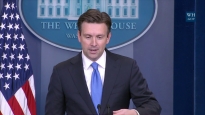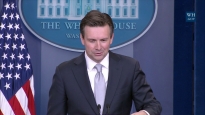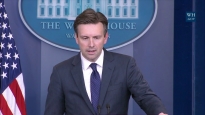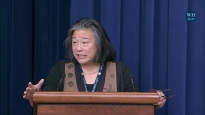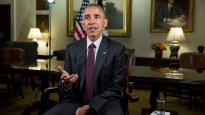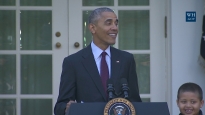President Obama Meets With Newly Elected Governors
December 02, 2010 | 18:16
President Obama and Vice President Biden meet with newly elected governors from both parties at Blair House and express their desire to work together to continue the economic recovery and create new jobs.
Remarks by the President and Vice President in a Meeting with Newly Elected Governors
1:04 P.M. EST
THE VICE PRESIDENT: Please sit down. Thank very much. Well, let me begin by saying congratulations to all of you. And, you know, I always ran for the United States Senate and would never have the courage to run for governor or mayor, because they know where you live -- (laughter) -- and you really have to get things done. In the Senate, we had a nice time. (Laughter.)
But seriously, congratulations. And I know all of you are facing, no matter how good a shape you’re in, your states because of this worldwide recession that hit us early on and because of the slowness of the recovery, although it’s recovering, you have a whole lot of daunting problems to face. And you all have to balance your budgets. And so we know it’s going to be tough.
What I can tell you, and if you talk to some of your colleagues who did not run this time, I’ve had the pleasure over the last year and a half literally to be in contact with every governor multiple times in trying to implement the Recovery Act. And I made a commitment to the governors, and I make it again. You may or may not need or want the assistance at the federal level on some of the things we might be able to be helpful on. But I guarantee you, any question you have, any difficulty you have in dealing with any aspect of the federal bureaucracy -- and I’ve kept this commitment -- pick up the phone and call me personally. I guarantee you I will have you an answer within 24 hours. And if I don’t have the final answer, I’ll call you within 24 hours and tell you when you’ll get the answer, because this is a partnership, whether we like it or not. I happen to like it.
But you’re the place where people look. You’re the place where all the basic services that determine the quality of their life are determined. And we want to be helpful.
One of the things we’re doing -- and I look around at the Cabinet members here, and they can attest to this -- is that we want to make sure that we are totally responsive. And when we don’t agree, we don’t agree. When we agree, we agree. But the only thing that is dangerous is uncertainty.
And so, rest assured you literally, not figuratively, can pick up the phone. I’d encourage you to call me. You probably don’t have to do that, because you’ll get responsive answers from the Cabinet members here. But if you do not or you’re having any difficulty, call and I’ll get you an answer.
Now, the other thing I want to say to you is that, you know, we -- I’ve had the chance to travel in most of your states and literally talk to thousands of your constituents, from your teachers and your firefighters to the business owners to mothers and fathers. Everybody is -- a sense of anxiety about is this thing going to keep moving.
And so, to the extent that we can all be on the same page in doing the one thing we all want to do, we want to provide people with jobs. We want to provide people with decent jobs and a decent opportunity. And part of it all relates to giving them some vision for how we’re going to get to the place that they want to be, which is once again with an economy that is growing robustly and with middle-class people having a fair chance of staying there and those seeking to get into the middle class have an equal opportunity to climb into it. Because that’s what I think, at least in my view, the vast majority of the people in your states want.
So, folks, we’re going to have to rebuild an economy together. We’re going to have to re-imagine a better future for the American people. And we’re going to have to renew a sense of hope in all of our constituents, all Americans, in order to get to the place we have to be.
I would just offer as an observation that I can’t think of any time -- as a student of history, like all of you -- where the American people, when given an even chance, that they have ever, ever, ever, ever, ever let their country down. I can’t think of a single, solitary circumstance in American history where that’s the case.
And I think what we’re all -- Democrats and Republicans -- are all about is giving people an equal chance, just give them a fighting chance. That’s all they’re asking for. And so we want to help you in any way we can.
And I know that old bad joke, I’m from the federal government and I’m here to help. But I am from the federal government, but we’re here, and use us as best you can in dealing with the problems you have.
So, folks, without further ado my real job here today is to introduce the President of the United States. And without any further explanation, ladies and gentlemen, let me introduce you to the President of the United States of America, Barack Obama. (Applause.)
THE PRESIDENT: Thank you so much, everybody. Thank you. Thank you. Thank you very much. Please, have a seat, have a seat.
Well, congratulations, first of all, to all of you for your victories, and welcome to the Blair House. You are part of a long line of illustrious visitors in this space. Winston Churchill used to hang out here when he was in the midst of working with FDR during World War II. Truman stayed here for four years when they were redoing the White House residence. And Abraham Lincoln was a close friend of the Blairs, so he used to visit here almost every night.
And as some of you I’m sure are aware, I read Lincoln a lot and think about Lincoln a lot. And I think one story that comes to mind right now is, at the time that he was President, visitors used to be able to come in -- Secret Service weren’t there to mag you and frisk you. And somebody demands to see him and insists on waiting. And finally Lincoln lets him in, and then guy says, “I’m responsible for you being elected President of the United States.” And Lincoln says, “Really?” He says, “Yes, I did all the work. I was one of your hardest workers. And now I expect some help.” And Lincoln says, “Well, let me tell you, if you are indeed responsible for helping me get elected, I forgive you.” (Applause.)
Now, some of you may feel the same way -- or at least you will in a month or so. But the truth is that as somebody who served in state government, I’m aware of the fact that state government and local government is where rubber hits the road. A lot of times we have a lot of abstract debates here in Washington, but each day -- and every day -- you are close to the ground and you are seeing the impacts of the decisions that are made, whether in Washington or in your state capitals, in very intimate ways.
And so I have nothing but respect and regard for the chief executives of all 50 of our states. And I am looking forward to working with each and every one of you. I want to spend most of my time in a dialogue, so I’m not going to give a long speech. I’m just going to remark on a couple of points.
Point number one: We have just had a very vigorously contested election, but the election is over. And now I think it’s time for all of us to make sure that we’re working together. I am a very proud Democrat, as some of you in the room are, although not as many as I had expected. (Laughter.) Some of you are very proud Republicans. But we’re all prouder to be Americans.
And this country has just gone through a wrenching two years -- the worst financial crisis since the Great Depression, and the toughest economy that most of us have seen in our lifetimes. And so as a consequence I think it’s absolutely critical that whatever our positions, whatever our parties, that wherever we can we can pull together to make sure that we’re doing right by the American people. And I know that everybody in this room believes that.
In that spirit, just earlier this week we had a meeting with both Democratic and Republican leaders here in Washington to start talking about how we can find ways to agree on promoting growth and promoting jobs across all 50 states. And I’m actually optimistic that before the end of the year we are going to have come to some agreements on some critical issues.
Obviously issue number one is making sure that on January 1st, middle-class families aren’t seeing their taxes go up as a consequence of the expiration of some of the Bush tax cuts that are currently in place and some of the tax cuts that we’ve put in place over the last two years. And so that’s going to be an important discussion over the next several days. I believe it will get resolved.
That doesn’t mean there may not be some posturing over the next several days. But I’m confident in the end people are going to recognize that it’s important for families who are still struggling to have some relief and it’s important for our economy to make sure that money is still out there circulating at a time when we are recovering but we’re not recovering as fast as we need to.
Along those same lines, I’m hopeful that we get the issue of unemployment insurance resolved. Some of you may be aware that as of today, you’ve got 2 million people who stand to lose their unemployment insurance over the course of the year. If we don’t do something, 7 million people could lose their unemployment insurance. That’s not also -- that’s not just a potential tragedy for those individual families. It could have a huge impact on your local economies because every economist of every stripe will tell you that unemployment insurance dollars are probably the ones that are most likely to be spent, most likely to be recirculated, most likely to help to boost small business and services all across your states and they’re going to have an effect on your sales revenue.
So our hope and expectation is, is that unemployment insurance -- something that traditionally has had bipartisan support -- is something that once again will be dealt with as part of a broader package.
Here’s the good news: The economy is on the uptick. We’ve now had five consecutive quarters of economic growth and we’ve had 10 consecutive months of private sector job growth. But I think we all recognize that it’s not moving as quickly as it needs to. And there are going to be a whole range of issues that we’re going to have to focus on together at the federal and state levels to assure not only that we get out of this crisis, but more importantly that we’re laying the foundation for long-term growth in the future.
And although there are going to be some disagreements on how we get there, there are going to be some areas where I think we agree. We all agree that we’re going to have to have the best educated workforce in the world because our children are now not just competing against other children in other states in our union, they’re now competing against kids in Beijing and Bangalore and Seoul, South Korea. And if they don’t have what it takes to compete, then America is going to have problems economically over the long term.
That’s why I’m so proud, under the guidance of Arne Duncan, that we have initiated some reforms that have garnered strong bipartisan support. And, frankly, as a Democrat, I’ve been willing to go after some long-held dogmas in our party in order to spring loose a smarter conversation about how we’re educating our kids.
Our Race to the Top program is something that has allowed states across the country to initiate reforms in a competitive way and make sure that ideas like charter schools get traction, despite previous resistance. And I’m hoping that we can cooperate with all of you to see how we can continue to make progress on the education front.
All of us are going to be interested in innovation and research and development. And there are governors here, or governors-elect here from both parties who are interested in clean energy, for example, and what can we do to make sure that wind turbines and solar panels and electric cars are made here in the United States, that that doesn’t become one more source of imports from other countries. And I’m eager to work with all of you on those issues.
I think it’s going to be very important that we work together on issues of spending. And each of you are going to be struggling with some very tough budgets. Washington is going to be in very tough budget circumstances. And many of you were elected on the basis that we’ve got to get control of spending because you care about the next generation. And if we continue down the path that we’re on, then we’re going to have problems. And what that means is, we’re going to be interested in hearing from all of you about programs that you think are working, but also programs that you think are not working. Contrary to the mythology, believe it or not, it turns out that I would love to eliminate programs that don’t work. And you guys are the ones oftentimes who are implementing them.
If there’s red tape or bureaucracy that we can eliminate it, we want to eliminate that. We have no interest in making your life harder. We want to be a partner for all of you in being responsive to your constituencies.
Now, I will confess that there are going to be times where we do believe that having basic national standards are going to be important; that there are certain things that we as a country, we as a people, aspire to, and that we need to maintain some consistency across the states. But for the most part, if there are going to be -- if there’s going to be experimentation, if states are going to continue to be laboratories for democracy, that’s something that we welcome and embrace.
And so if you have ideas around any of the issues that my Cabinet members who are here are responsible for, I guarantee you will get a serious response from them in terms of how we can work together.
So to sum up my initial remarks, I heard -- I overheard Joe say that he will always take your call. I promise you, he will be calling you. At a certain point you may say, “It’s Biden again.” (Laughter.) But I think the same is going to be true for Valerie Jarrett, who heads up our Intergovernmental Affairs. The same is going to be true for our various Cabinet officials. They are going to want to hear from you.
And the one thing that I would urge is don’t wait until you’re really mad about something before you call us. We’d prefer not to read about it in the press. (Laughter.) We’d rather you call us ahead of time and say, you know what, we think this isn’t working. We think this is a better way of doing things. And we’ll work with you. And if we don’t agree with you, we will spell out in great detail why we don’t agree with you. And it’s not going to be based on ideology. It’s not going to be based on partisanship. It will be based upon our best judgment about how we move forward with the policy objectives that we all share.
And if we end up disagreeing on something, I promise you we will not be disagreeable about it. And we will keep on working until hopefully we can figure out a way to solve problems.
In the end, I think that’s what this most recent election was all about. People are frustrated, understandably, with an economy that has stalled and is not doing as well as it should for American families. And that was true not just during this crisis but it was true for the decade before this crisis. And I think what the American people are expecting from all of us is that -- not that we suddenly put aside politics, not that we put aside principles, because everybody here is driven oftentimes with some very strongly held principles about what America should be and how we can move forward, but that at a certain point we also concern ourselves with governing and delivering for them.
And I know of no group of people who more consistently steer in that direction than governors, because ultimately the buck stops with you in your state, just as the buck stops with me at the national level.
And so I look forward to working with you and I look forward to seeing you again fairly soon. We usually host a governors bash early in the year, and that way I’ll have a chance to meet all your spouses and you guys will get dressed up and look really good. (Laughter.)
All right? Okay. With that, we’re going to clear the press out of the room so that all these folks can be -- tell me what they really think about me. (Laughter.)
END 1:23 P.M. EST
|
November 30, 2016
|
November 29, 2016
|
November 29, 2016
|
November 28, 2016
|
|
November 28, 2016
|
November 25, 2016
|
November 24, 2016
|
November 23, 2016
|
- &lsaquo previous
- …
- 5
- 6
- 7
- 8
- 9
- 10
- 11
- 12
- 13
- …
- next &rsaquo
